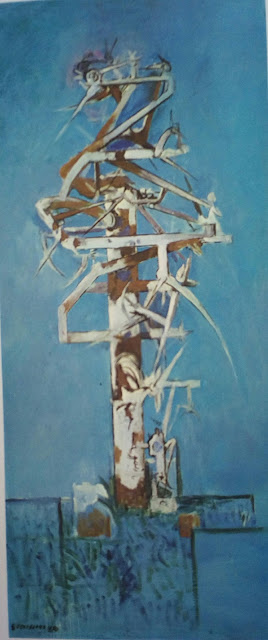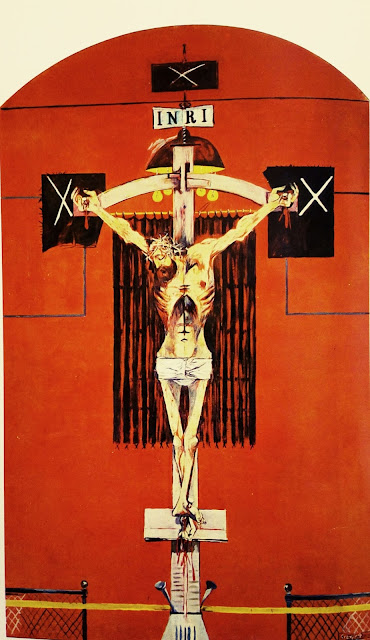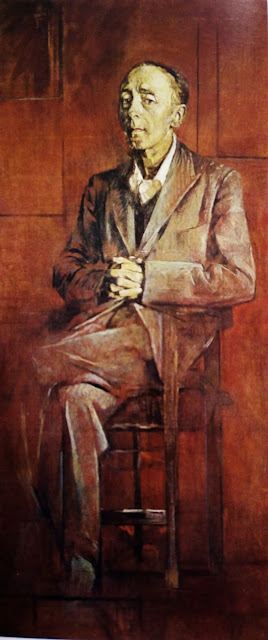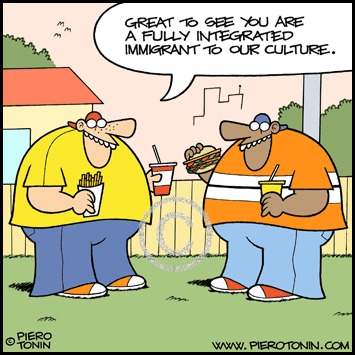A very very
old kind of ignorance, you know, makes many people blame immigrants about
everything. Among the reasons a country may have a racist behaviour, we can
number its history, its welfare, its education system, and, obviously, its
politicians.
Italy is
(has always been) a suspicious, sometimes a little scared country towards other
cultures. Since I’m from Italy but live in London, I’m very well acquainted
with that particular curiosity of the Italian citizen who wonders all the time:
“What does the rest of the world think about us, about our accent, about our
government?...” And this is really good,
insofar as it helps a country to import the best aspects and ideas from other
places; but, most of the times, this curiosity just shows the fact Italy doesn’t
feel part of an international, multicultural system. Officially, beyond the
Alpes and Sicily, there’s a strange, exotic, huge region which tries all the
time to weaken Italian economy and integrity; there are threats everywhere: both
EU and immigrants make Italy terribly poor.
Immigration
from Libya, from Syria, from many African countries etc. is one of the main
Italian problems; which means, immigrates themselves are not the problem, but
the way they are to be admitted and treated in Italy. Should you ignore this,
lots of them die during their (very expensive) journey throughout the
Mediterranean. Many of them are exploited for very hard and underpaid harvesting
jobs in Southern plantations, which also led to some riots by black immigrants against
the caporali (the unofficial “masters”
of many poor day labourers).
One of the
most efficient methods thanks to which some politicians gain votes and support
is blaming people from different cultures, with a different skin. They steal
our jobs, they rape our women, they don’t pay taxes, they stink, they drink,
and obviously the reason of their actions is always easily recognizable. The last legend about immigrants, especially the black ones, is that, as
soon as they reach the Italian soil, they earn money daily (thanks to
Italians’ taxes!) without any job, they get a house, and, in many cases, they
can live in luxury hotels without any extra costs.
This legend
was steadfastly told by politicians during the catastrophic earthquake of
August 2017 which damaged several towns of central Italy: making people think
about all the honest Italians who lost their houses in comparison with all the
unemployed immigrants living serenely in a five stars hotel and eating pasta
all the time was a very smart strategy which racist parties could shake
Italians’ basic instincts with. When a country is in dire straits, what’s
better than channelling fools’ rage against imaginary problems?
But a
sassy champion suddenly came, the chosen one who could laugh at such a
legend in order to spread the truth; a black hero wearing horrible, shiny
clothes who sang to Italian people their own shallow, narrow-minded opinions:
his name is Bello Figo (something like: handsome
cool guy). This young
superslim Ghanian guy with a Hello Kitty tattoo on his chest, this rapper-like
singer whose music videos nowadays count millions of views, made many (not
musically brilliant, that’s true) songs about all the main Italian stupid
commonplaces. He lives in Parma, but he didn’t emigrate to Italy on a boat,
like many of his compatriots; he sings in Italian, and his strong African accent makes some Italian words particularly funny.
This
artist of trolling, this juggler of bad words mocked basically all the topics
you could find in a typical conversation between Italian dumbasses: from the
enviable richness of Berlusconi the Great to the legendary strenght of
Juventus, from the famous evergreen charm of Benito Mussolini, the
unforgettable, efficient, still very sympathized with dictator of the 40s, to the
immortal beauty of famous actors; not to talk about the compelling wish of sexual
pleasure (let the epic line be told: I’ll
bed you ten times, and after that I’ll block you on WhatsApp), or the rampaging
fear of the IS group.The expensive smartphone, the branded belt, the gossip tv shows: any of the most common Italian topics have been told in his songs which won him fame and money.
But most of
Bello Figo’s art is expressed in his songs about all the morons’ certainties about
immigrants. He sang all of them, as an open-hearted street performer: I love
raping the Italian girls, I steal bicycles as soon as I can, I live with the
government’s benefits, I hate working, Italian president allowed me to pass
your borders and eat your food etc. Bello Figo’s technique is a refined provoking
scream towards all the natural born white patriots. “I beat my son”, he sings
in his darkest song, Sono bello come
profugo, despite of the fact he definitely has no children; namely, hate me
because I’m a black violent person.
How Italian
average donkeys reacted to his fame, that’s not difficult to imagine: they took
Bello Figo very very seriously, to the point he was invited by some tv shows in
order to be scolded and insulted by politicians and crowds of poor Italians
worried about their wallets and their dignity. The rage of the Member of the
European Parliament Alessandra Mussolini (yes, she’s his granddaughter), and
her scream: “Go back to your country!” are probably the best proof that Bello
Figo won against everything and everyone. He can already afford to be insulted
by very important people, which means his style got exactly what it was meant
to get. He played a role for long time, and obviously only few were smart
enough to notice that it was just a role.
Bello Figo
is not just a cunning youtubber; he’s a symbol, an outcome of chrisis of values
(more than economical chrisis), the most perfect reaction to the great
xenophobic trend which seems to affect more and more the Western countries. I’m
not saying I’m sure he’s conscious to
be a symbol: probably someone behind him expressly created his style and his
lyrics, in order to make him a funny rich icon of our times. But this doesn’t
really matter. Everyone knows you need some intelligence to appreciate irony:
during a very hard time for Italy, it looks like most of Italians prefer to
blame Bello Figo instead of politicians, since (oh my God!), he’s taunting all
the spotless homeland-loving taxpayers, getting a living out his bad jokes
about immigrants’ life of leisure.
Even a very popular Italian tv show, Striscia la
notizia, which always claimed to be the “voice of justice”, accused Bello Figo
of “peopleism” (gentismo), since he
got a lot of money out of honest people’s indignation (angry people are
probably most of the viewers of his videos). “Maybe people who fight against
crisis and high cost of living don’t feel like listening to your irony, don’t
you think?” the justice-maker journalist asked the Ghanian artist, who now,
apparently, is finally ready to exit the Youtube box and make concerts
throughout Italy. Thank you, Italian sense of humour, you made him great,
although your xenophobic mien is undoubtedly stronger than everything: just few
hours ago (it’s January 20th) I read that Bello Figo’s scheduled jig
at Supersonic Music Club in Foligno (Perugia) has been cancelled because of the countless amount of racist
insults he got. And this is not the first time.
The fact
is: he’s not but singing all the bad jokes and myths created by media and
politicians, who got money and power out of people’s silliness and vulgar
instincts; the same silliness and instincts, I’d like to say, which took UK
away from Europe. I want to ask you: since hordes of dumbasses get more and
more angry when he shows (on purpose) an irksome behaviour, and given the fact
he becomes more popular thanks to this indignation, why shouldn’t he be
irksome? “Do you know we’re paying your rent with our money?” a sulking honest
citizen asked Bello Figo during the above-mentioned show hosting Mussolini; he
smiled with amusement, and his answer definitely deserves to be written in
history books: “That’s okay the same to me”, which, of course, made all people surrounding
him screaming more and more with shame and anger. That’s exactly the point: how
can people not see the art of trolling, even when it clearly attacks people’s
credulity?...
Bello Figo's most famous song, No pago affitto
(I don’t pay rent), whose lyrics
has been subbed in English in one of the Youtube videos, is probably the best summary
of Italian prejudices. Featuring his (obviously black) friend The GynoZz, this
song is vocal in declaring that immigrants don’t need to pay rent, nor to be
worried about a house, a car, a job. “I won’t be a worker” Bello Figo proudly wrote
in the lyrics, “I came here with my friends, and as soon as we arrive we get
money, car, pussies.” What the shame! How can a black guy insult the honest
Italian worker struggling to survive, and instigate young people to violence
against women? “We want a salary and a broadband... I won’t soil my hands,
because I’m already black.”
By mentioning the former Prime Minister Matteo
Renzi, who doesn’t have anything to do with the immigrants' "absolute freedom", in this song Bello
Figo managed to talk basically about every aspect of Italian narrow mentality
in just one song; since the average citizen blames politicians about any problem,
not being mature enough to take care about their own needs and questions, Bello
Figo did exactly the same in No pago
affitto, depicting the materialist laziness which lets people writing
thousands of derogatory posts against the government without any cautious
criteria.
Bello Figo is
a sociologic, worthy of attention phenomenon. He sang (as I said before, maybe
unconsciously or fulfilling someone else’s marketing plan) the decay of Western
society, morbidly attached to money and banal commonplaces, by showing that
people are always ready to hate but never ready for irony, or at least self
irony; they’re too immature to laugh at their own silliness. He’s the mirror of
the average wishes: sex, money, fame; more than that, he’s the mirror of
leaders’ petty, xenophobic lies. Apart from his terrible pronunciation, his
monotonous rhythm, his parodic clothes and accessories, this lucky artist gave
us a lesson of seriousness; you need to be serious to be able to laugh.
If a coloured-hair
guy singing jokes about prejudice is so frown upon that his jigs are cancelled,
how should we feel about politicians spreading that prejudice? I think Italy,
and not Italy only, cannot realize its priorities, and that Bello Figo definitely
deserves all the money he got.





















